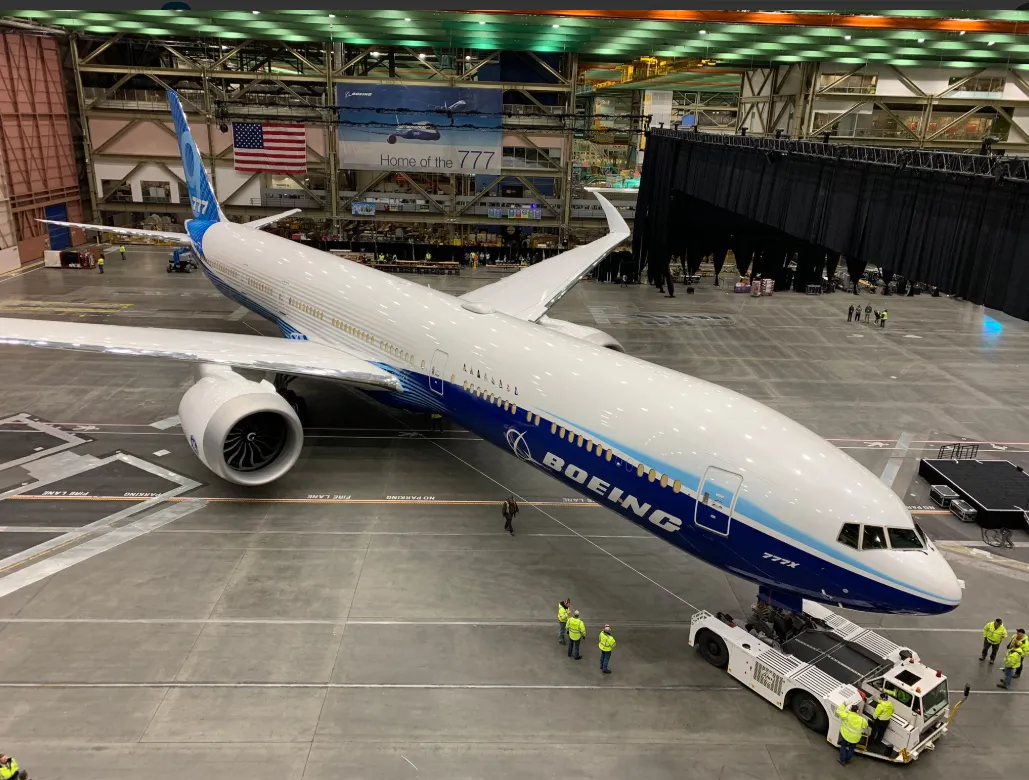
Boeing 777X first flight delayed till early 2020
Jul 24, 2019

The inaugural flight of the Boeing 777X has been postponed to early 2020, causing concern among stakeholders and aviation enthusiasts. This advanced aircraft, designed to enhance fuel efficiency and passenger comfort, has faced challenges related to its development and certification processes. Delays in the testing of its new technologies, including the innovative wing design and updated engines, have contributed to the rescheduling. Boeing aims to ensure that the 777X meets all regulatory requirements and performance standards before its first takeoff, emphasizing safety and reliability in its long-awaited entry into the commercial aviation market.
The aviation industry has been abuzz with news regarding the "Boeing 777X" and its much-anticipated first flight. Originally slated for 2019, the timeline has now been pushed back to "early 2020". This delay has raised questions and concerns among aviation enthusiasts, airline operators, and investors alike. In this article, we explore the reasons behind the delay, the impact it may have on the aviation market, and the significance of the "Boeing 777X" in the broader context of commercial aviation.
Reasons for the Delay
The delay of the "Boeing 777X" first flight can be attributed to a combination of factors, primarily centered around the extensive testing and certification processes. Boeing has emphasized the need for rigorous testing to ensure the aircraft meets safety and performance standards. Some of the primary reasons include:
- Engine Testing Issues: The "GE9X" engines, developed by General Electric, experienced delays in their testing schedule. These engines are crucial to the performance of the "777X", and any setbacks in their testing directly impact the aircraft's timeline.
- Regulatory Compliance: Boeing is working closely with aviation regulatory bodies to ensure that the "Boeing 777X" complies with all safety regulations. This includes addressing any updates or changes in safety standards that have emerged since the initial design phase.
- Design Modifications: Feedback from test simulations has led to necessary design modifications, which take additional time to implement and test thoroughly before the aircraft can take its first flight.
Impact on the Aviation Market
The delay of the "Boeing 777X" first flight has significant implications for the aviation market. Airlines that have placed orders for the aircraft are now facing uncertainties regarding their fleet expansion plans. Here's how the delay affects various stakeholders:
| Stakeholder | Impact |
|---|---|
| Airlines | Airlines may need to reassess their fleet strategies and may continue to rely on older aircraft models longer than anticipated. |
| Investors | Investors may experience fluctuations in Boeing's stock prices as the company navigates this delay and its implications. |
| Suppliers | Suppliers involved in the production of the "Boeing 777X" may face adjustments in their production schedules, affecting their financial planning. |
Significance of the Boeing 777X
The "Boeing 777X" represents a new generation of long-haul aircraft that promises to deliver improved efficiency, performance, and passenger comfort. Here are some key features that highlight the significance of this aircraft:
- Fuel Efficiency: The "777X" is designed to be more fuel-efficient than its predecessors, providing airlines with substantial savings on fuel costs.
- Advanced Technology: The aircraft incorporates state-of-the-art technology, including the latest avionics and flight control systems, which enhance safety and operational efficiency.
- Passenger Comfort: With larger windows, improved cabin pressure, and quieter engines, the "Boeing 777X" aims to provide an enhanced travel experience for passengers.
Future Outlook
Despite the delay in the first flight, the future of the "Boeing 777X" remains promising. As Boeing works through the challenges, industry experts believe that the aircraft will be well-received once it enters service. Here are some of the anticipated outcomes:
- Increased Orders: Once the "Boeing 777X" successfully completes its test flights and gains certification, airlines are expected to place additional orders, eager to upgrade their fleets.
- Competitive Edge: The "777X" is poised to compete with other next-generation aircraft from rival manufacturers, and its successful launch will solidify Boeing’s position in the market.
- Long-term Growth: The demand for air travel is projected to grow in the coming years, and the "Boeing 777X" is positioned to meet this demand with its advanced capabilities.
Conclusion
The delay of the "Boeing 777X" first flight until "early 2020" may present challenges, but it also underscores Boeing's commitment to delivering a safe and high-performance aircraft. As the aviation industry continues to evolve, the "Boeing 777X" will play a crucial role in shaping the future of long-haul travel.
As we await the first flight, stakeholders across the aviation spectrum remain optimistic about what the "Boeing 777X" will bring to the skies.
Related Articles

Explore Thailand: The Best Islands to Visit for Paradise, Adventure, and Relaxation

The Ultimate Guide to the Best Islands in Thailand for Your Next Getaway

Do babies need passports? How to get a passport for a newborn

How to get a U.S. passport fast: here’s how to expedite the process

What is Mobile Passport Control: 5 reasons why you should use it

SENTRI vs. Global Entry: A detailed guide

Do you need a passport to go to the Bahamas? Let’s find out

Do you need a passport to go to Mexico? A detailed guide

Do you need a passport to go to Canada? We got the answer

Do You Need a Passport for a Cruise: An Essential Travel Guide

Booster Seat Requirements: All the Rules to Follow in Your Rental Car

What Are the World’s Most Powerful Passports, and How Does Yours Rank?

How to Take a Passport Photo at Home: A Helpful Guide

You've got to have heart! Southwest's new livery

Your opinion: Should water be free on low cost carriers?

Young women bolder than guys as solo travellers
